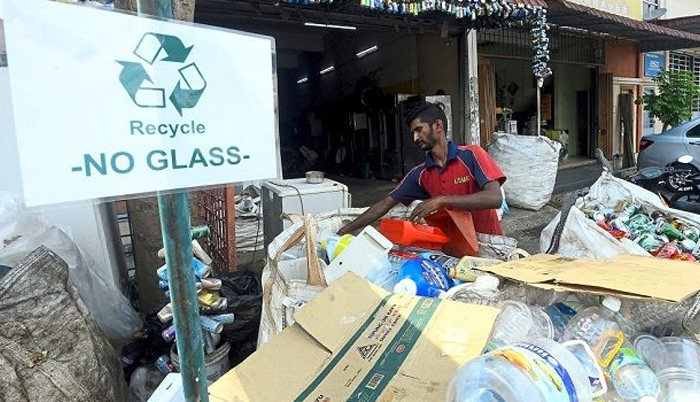![]() Home > Malaysia
Home > Malaysia
No Money To Be Made In Recycling Glass In This Age Of Plastic

![]() May 19th, 2022 | 10:10 AM |
May 19th, 2022 | 10:10 AM | ![]() 639 views
639 views
PETALING JAYA
You buy a bottle of your favourite fruit juice, slurp it down and then throw it into the nearest bin. The whole process may just take 10 minutes – but that glass bottle could be here for 1,000,000 more years.
Glass is not being recycled, at least not in a major way.
Most recyclers are business-driven and only focus on materials that give them the most returns, like plastic and paper.
Environment and waste management specialist Dr Theng Lee Chong said the reason plastic is favoured over glass is because it can fetch a better price in terms of reselling and production cost.
“Other factors that turn recyclers off from glass are that it takes up more space, weighs more and is harder to handle in terms of transportation and logistics.
“Not all types of glass can be recycled. Bulbs, sheet glass, windshields and car accessories as well as windows cannot be recycled because some may contain hazardous material like mercury.
“Bottles are the only ones to be recycled. Some manufacturers of bottled products recycle the bottle themselves through a sterilisation process. Some accept crushed glass that have mixed colours as they are easier to transport and store.
“Like most waste, glass which is not recycled ends up in landfills. It is not biodegradable but obviously there is less glass than plastic in our landfills,” he said.
Dr Theng cited a famous brand which switched to plastic worldwide from its traditional glass bottle after analysis showed that plastic was friendlier to the environment because it could be recycled.
He said plastic is also easier to manage, does not break, costs less to transport in higher volume and can be stored easily.
Malaysia generates approximately 14 million tonnes of municipal solid waste (MSW) annually, of which 43.7% consists of dry recyclables such as plastic, paper, glass, metal and tetra pack.
But the rate of recycling is still considered low, even though it has increased over the last seven years from 10.5% to 28.06% in 2019. Most of the disposed waste ends up in the landfills.
In South-East Asia, Singapore has the highest daily waste generation per capita at 3.72kg person per day, followed by Malaysia at 1.21kg.
Prof Dr P. Agamuthu from the Jeffrey Sachs Centre on Sustainable Development at Sunway University said one of the main reasons there is a disparity between glass and plastic recycling is the volume.
Dr Agamuthu said the volume of glass material in waste only amounts to about 1% as compared to plastic which is between 15% and 24%.
“Glass is heavier and bulkier, which means transporting it costs more. There is also the issue of the limited end market usage for glass.
“Glass has to be heated up to 1,500 degrees to be recycled while plastic doesn’t require that much. Then, there is colour separation. You cannot mix bottles of different colours, so that is another level of separation.
“Glass can end up lying at the landfill for a million years while plastic needs 1,000 years to degrade depending on the temperature and other elements,” he said.
In the long run, he said plastic would be the better choice for its durability and recyclability elements.
He said glass is mainly used for alcoholic drinks and medicine because they could react to plastic, otherwise it would be the go-to-option for many makers.
For glass, Dr Agamuthu proposes an olden day approach, whereby any bottled drinks could be returned to the shop owners for a price, which then can be returned to the manufacturers to be reused after sterilisation.
Alliance Of River Three founder Kennedy Michael said Malaysia is the biggest producer of plastic pallets, the raw materials used to make plastic products.
As such, the dependency on plastic is higher, Michael said.
But that is not to say plastic is better.
“Glass is an energy intensive product but it does nothing to the environment when discarded. Plastic, with its microplastic toxins, has a direct impact on the environment and habitat.
“Plastic is cheaper and it is a good product but the problem is in its degrading process for 1,000 years combined with its radioactive elements,” he said.
It has to be picked up and recycled.
“If you take the current minimum wage of RM1,500, it works out to between RM8.52 and RM7.21 per labour hour depending on the number of working days. Hundreds, if not thousands, of volunteers are needed to clean up trash every week,” said Michael.
“That is a monetary cost to the economic system and productivity of a nation. Valuable resources are spent on trash, that is one of the hidden costs of plastic.”
Crushed glass, meanwhile, can be used with cement in the construction industry, which can be a viable business.
Source:
courtesy of THE STAR
by FAZLEENA AZIZ, JUNAID IBRAHIM and IMRAN HILMY
If you have any stories or news that you would like to share with the global online community, please feel free to share it with us by contacting us directly at [email protected]